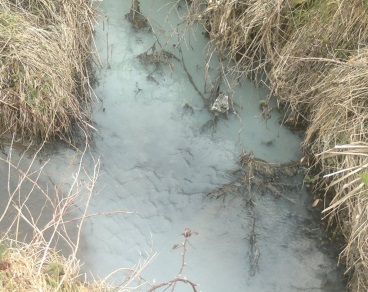
Water pollution incidents rose to 28 in 2013, up from 24 in 2012, an annual report published by the Department of Environment, Food and Agriculture shows.
The year saw the Environmental Protection Unit (EPU) deal with pollution incidents in rivers, harbours and beaches, with 27 categorised as minor (only a limited effect on water quality and aquatic life) and only one as significant (more harmful, widespread effects on water quality and aquatic life). No incidents were in the ‘major’ category (widespread, persistent damage to aquatic life) in 2013, in contrast to 2012, when there were three major incidents, including a substantial fish kill.
Despite not leading to widespread contamination or fish kills, many of the incidents discovered in 2013 required multiple visits, both to stop the pollution and to clean up sites so they could recover, the report – /media/1196114/river_pollution_incidents_2013.pdf – states.
Two major farm slurry spills in 2012 resulted in the EPU taking successful legal action against the perpetrators. No slurry-related incidents were recorded in 2013, but there was an increase (from one in 2012 to eight in 2013) in incidents involving suspended solids, such as mud and silt. These usually involve run-off from construction or quarry sites or newly ploughed fields following heavy rain. Oil, sewage and other pollutants make up the rest of the cases.
River quality is a long established and reliable indicator of the ‘health’ of the environment and it remains under pressure from incidents such as sewage spills and oil leaks, as well as run-off of silt and mud from poor building and agricultural practices. Inland waters are protected by the Water Pollution Act 1993.
It’s the second year in a row that incidents have increased. In 2008, 49 incidents were recorded. That fell to 30 in 2009, decreased again to 25 in 2010 and dropped by another five to 20 in 2011.
Phil Gawne MHK, Minister for Environment, Food and Agriculture, said:
‘The countryside and its wildlife are invaluable assets that everybody has a duty to protect and all businesses should behave in a responsible and sustainable way that doesn’t inflict damage to our natural resources.
‘The more we can reduce the number of pollution incidents, the more chance sensitive wildlife has a chance to flourish.’
He urged the public to remain vigilant, saying:
‘I’d encourage people to contact the EPU immediately they witness a water pollution incident, rather than leave it days or even weeks to report the problem, because by then damage may well have been done to the habitat and wildlife and the polluter not identified or held to account.’


